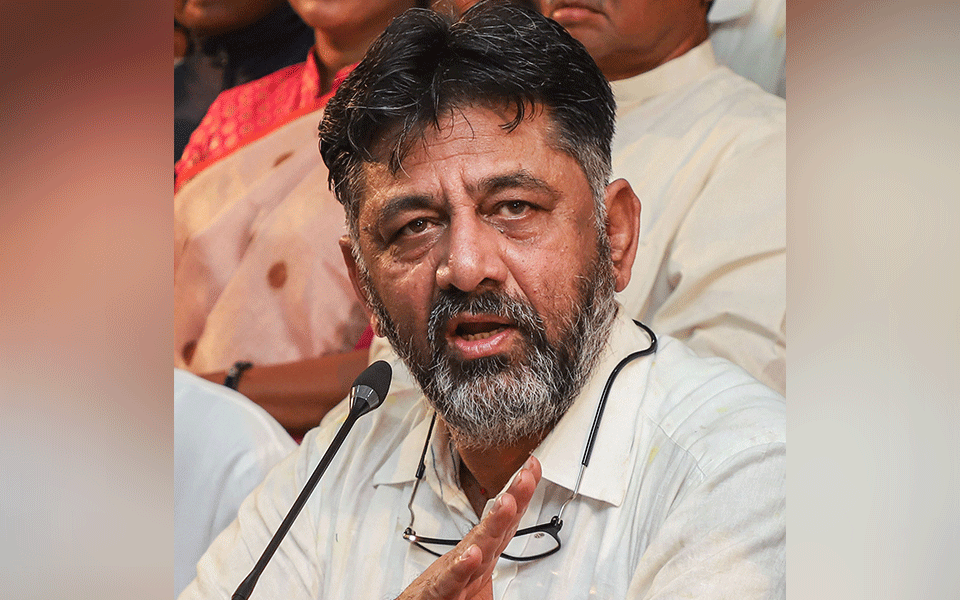Bengaluru (PTI): Karnataka Deputy Chief Minister D K Shivakumar on Thursday said that the state has filed a petition before the Cauvery Water Management Authority (CWMA) seeking a review of its order on the release of water to Tamil Nadu, and the government is making all preparations to go ahead with the Mekedatu balancing reservoir across the river.
Pointing out at the scarcity of water at the reservoirs in the Cauvery basin, despite rains in some areas in the past couple of days, Shivakumar, also the state's Water Resources Minister, said the government has managed to save the standing crops in the region and is hoping for more rains in the days to come for the situation to improve.
"We have already appealed (before CWMA) expressing our inability to release even 3,000 cusecs; not sure when it will be taken up. We have also made a proposal regarding the Mekedatu issue. We are in full work, and we are making all the legal preparations required for it," he told reporters here.
Asked if the state will also go before the Supreme Court on the issue, he said, "...we will have to go stage by stage, or else it (our petition), will not be entertained in the courts."
To a question on formulating a distress water-sharing formula to be followed in times of deficit rains, he said, "Let this year get over, we will see later...ask our MPs regarding it."
The CWMA on September 29 asked Karnataka to release 3,000 cusecs of water daily to Tamil Nadu till October 15, despite the upper riparian state stating that there is not enough storage in its reservoirs.
The Karnataka government has been maintaining that construction of the Mekedatu balancing reservoir across the river near Kanakapura in Ramanagara district is the only solution to resolve the inter-state water dispute during distress years.
Tamil Nadu is opposed to this project, claiming it would be detrimental to its interest and that of its farmers.
Noting that 106 tmc water is required, but there is only 56 tmc in Cauvery basin reservoirs, Shivakumar said that inflow had increased during the last couple of days due to some rains, but it has now come down.
"Inflow of 23,000 cusecs was there on October 2. It was 13,000 cusecs on October 1, 20,000 cusecs on October 3, and 15,000 cusecs on October 4. On October 5, it came down to 10,000 cusecs," he said.
The DCM claimed that the standing crops of the state's farmers have been protected with this water, and called it a respite.
"Drought has been declared and we have requested the agriculture department to ensure that there is no more fresh cropping until there is an intimation about enough water. Another spell of rain is expected some time next month. We will decide based on that," Shivakumar added.
Let the Truth be known. If you read VB and like VB, please be a VB Supporter and Help us deliver the Truth to one and all.
Panaji (PTI): As part of a crackdown against tourist establishments violating laws and safety norms in the aftermath of the Arpora fire tragedy, Goa authorities on Saturday sealed a renowned club at Vagator and revoked the fire department NOC of another club.
Cafe CO2 Goa, located on a cliff overlooking the Arabian Sea at Vagator beach in North Goa, was sealed. The move came two days after Goya Club, also in Vagator, was shut down for alleged violations of rules.
Elsewhere, campaigning for local body polls, AAP leader Arvind Kejriwal said the fire incident at Birch by Romeo Lane nightclub at Arpora, which claimed 25 lives on December 6, happened because the BJP government in the state was corrupt.
An inspection of Cafe CO2 Goa by a state government-appointed team revealed that the establishment, with a seating capacity of 250, did not possess a no-objection certificate (NOC) of the Fire and Emergency Services Department. The club, which sits atop Ozrant Cliff, also did not have structural stability, the team found.
The Fire and Emergency Services on Saturday also revoked the NOC issued to Diaz Pool Club and Bar at Anjuna as the fire extinguishers installed in the establishment were found to be inadequate, said divisional fire officer Shripad Gawas.
A notice was issued to Nitin Wadhwa, the partner of the club, he said in the order.
Campaigning at Chimbel village near Panaji in support of his party's Zilla Panchayat election candidate, Aam Aadmi Party leader Kejriwal said the nightclub fire at Arpora happened because of the "corruption of the Pramod Sawant-led state government."
"Why this fire incident happened? I read in the newspapers that the nightclub had no occupancy certificate, no building licence, no excise licence, no construction licence or trade licence. The entire club was illegal but still it was going on," he said.
"How could it go on? Couldn't Pramod Sawant or anyone else see it? I was told that hafta (bribe) was being paid," the former Delhi chief minister said.
A person can not work without bribing officials in the coastal state, Kejriwal said, alleging that officers, MLAs and even ministers are accepting bribes.





